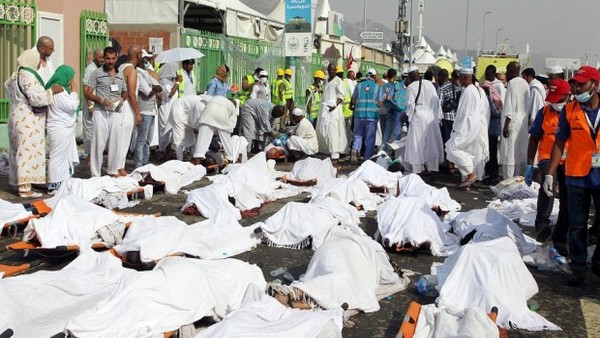De l’intox au sujet du ramassage des cadavres par des bulldozers à Mina

L’affaire du ramassage des cadavres des
centaines de pèlerins par des bulldozers n’est finalement que de la
manipulation dans laquelle sont tombés tous ceux qui avaient repris
cette information. « Il ne viendrait assurément à personne l’idée de
dédouaner le pays organisateur multiséculaire du Pèlerinage, l’Arabie
Saoudite, qui aura indubitablement péché par une négligence technique
coupable (…), mais pourquoi diable, sous prétexte de partager la douleur
de la Oumma islamique, s’obstine-t-on à jeter de l’huile, au point de
monter de toutes pièces une saillante contre-vérité, dans l’intention
manifeste de semer la zizanie dans les esprits ! », a regretté Mame
Mactar Guèye.
Estimant qu’un crime
n’est jamais parfait, le Vice-président de Jamra souligne que « les
auteurs de cette manœuvre d’intoxication auront, dans leur excès de
zèle, lamentablement ‘trébuché’ sur deux flagrantes évidences ». Selon
lui, « eux qui se sont donné la peine de ‘zoomer’ l’image de propagande
auront aisément pu se rendre compte que la pelle du bulldozer ne
contient aucun corps humain, mais plutôt des détritus, comme il y en a
toujours après un événement aussi important, occasionnant la convergence
de centaines de milliers d’individus sur un même site ». Deuxièmement,
indique-t-il, « après la bousculade meurtrière de 2005 (qui avait fait
251 victimes) l’Arabie saoudite avait décidé d’entamer une série de
travaux d’agrandissement des infrastructures, pour améliorer la mobilité
des pèlerins (…) ».
Et d’ailleurs,
poursuit-il, « c’est justement à l’occasion de ces grands chantiers que
la stèle (bien visible sur la photo des propagandistes) avait
complètement disparu du paysage de Mîna (…) Les autorités saoudiennes
décidèrent de substituer cette stèle par un muret ovale, permettant
ainsi aux pèlerins de disposer d’une plus large surface de lapidation ».
Concluant, Mame Mactar Guèye souligne que « dans leur précipitation à
colporter leur ‘information’ malsaine, les propagandistes ont mis une
photo comportant l’ancienne stèle, datant d’avant les travaux de 2005 !
Et qui avait été, à cette occasion, démantelée et remplacée par un large
muret ovale – qu’il est loisible à quiconque de voir dans toutes les
photographies récentes ou reportages télévisuels du pèlerinage actuel ».
Le Populaire

